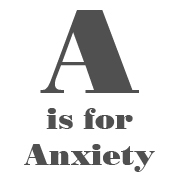A is for Anxiety
Aimee C. Kimball, PhD

Many athletes have similar signs of anxiety, whether it's shaking hands, difficulty breathing, or tight muscles, almost every athlete has some signs of competition anxiety. However, some athletes' anxiety isn't as extreme because they are able to control it, both by controlling their thoughts and by engaging in physical relaxation exercises. This article discusses ways to regain control of your body and your mind so that you can perform your best.
Why do I have anxiety?
 Simple, because you're an animal. All animals (humans included) have what's called the fight-or-flight response in which our bodies prepare to either fight a challenge or to run away from it. A good example is a porcupine. When these animals are relaxed they look cute and harmless, but as soon as they feel threatened or challenged their quills pop up and they are ready to act. Our bodies do the same thing by sending what most people refer to as adrenaline through our bodies to give us the extra umph to fight the competition or to get out of its way. These symptoms of anxiety aren't always bad, as they can signal a readiness to compete. Think of a match you were involved in that wasn't important to you or where you knew you would win it easily. You probably didn't have the same signs of anxiety because you didn't see this event as being as threatening. The perception of a challenge/threat is what makes athletes feel anxious.
Simple, because you're an animal. All animals (humans included) have what's called the fight-or-flight response in which our bodies prepare to either fight a challenge or to run away from it. A good example is a porcupine. When these animals are relaxed they look cute and harmless, but as soon as they feel threatened or challenged their quills pop up and they are ready to act. Our bodies do the same thing by sending what most people refer to as adrenaline through our bodies to give us the extra umph to fight the competition or to get out of its way. These symptoms of anxiety aren't always bad, as they can signal a readiness to compete. Think of a match you were involved in that wasn't important to you or where you knew you would win it easily. You probably didn't have the same signs of anxiety because you didn't see this event as being as threatening. The perception of a challenge/threat is what makes athletes feel anxious.
Changing the Perceived Threat
Unfortunately, you do not control who you compete against. You do not control the event importance. You do not control the weather, the calls your opponent makes, or your partner. Since you don't control those things you don't have to worry about them. However, you do control what you focus on and how you respond to the situation. Instead of focusing on situational factors that you can't control, choose instead to focus on what helps you to play well. Focus on a smooth stroke, placement of the ball, following through—all things you control. Basically, choose to focus on the task (connecting the paddle with the ball) rather than the situation (set point). If you focus too much on the situation you are complicating something easy. All you have to do is play platform tennis, basically just hit the ball over the net. That's simple, right? When you start to add threats to your focus (competing against a good opponent, the consequences of losing/winning, how your partner perceives you, you are adding thoughts to your head that don't need to be there. In essence, you are creating mental weights, and just like you wouldn't want compete with weights around your ankles, you certainly don't want to play with them in your head. So lighten the load, choose your mindset, and learn to focus on what will help you to play well.
Physically Relaxing
tension can hinder your performance because it can change your stroke. breaths from the bottom of your lungs, inhaling through your nose and the physical and mental stress leaving your body. As you inhale, picture exhaling through your mouth, you will slow down your heart rate, which will slow down the rest of your system. As you exhale, you can picture all the physical and mental stress leaving your body. As you inhale, picture that you are breathing in calming energy and say something confident to also take a few minutes each day to go through each of your muscle groups, tightening them and then relaxing them. By doing this that you can perform your best. progressive relaxation, you can recognize when and where you are carrying physical tension and learn to physically loosen your muscles so that you can perform your best.
Therefore
Anxiety as you know it doesn't have to exist. You may have some physical activation (faster heart rate, quicker breathing) but you can control this. Simply think how you want to think and leave some time for a pre-point routine that allows you to physically relax. While it requires training, you can regain control of your body by taking control of your mind.
Make it Great!
Dr. Aimee C. Kimball is the Director of Mental Training at the University of Pittsburgh Medical Center's Center for Sports Medicine. She received a PhD from the University of Tennessee where she specialized in sport psychology. She is an Association of Applied Sport Psychology Certified Consultant, and is a member of the American Psychological Association, the United States Olympic Committee's Sport Psychology Registry, the USA Swimming Sports Medicine Network, and the NCAA Speakers professional, collegiate, high school, recreational, and youth athletes in a variety of sports, and assists the Pittsburgh Steelers in analyzing potential draft picks and the Pittsburgh Penguins in developing their nation and has appeared in Men's Health Magazine, Runner's World, Athletic Management Magazine, various local and national newspapers, and has appeared on ESPN, NPR, and news broadcasts across the country. Recently, Dr. Kimball was named as one of Pittsburgh Magazine' s Top 40 People Under 40 for her dedication to improving the Pittsburgh region. Currently, Dr. Kimball works with athletes, coaches, corporate leaders, and other performers to assist them in achieving success in sport and life. (412-432-3777; kimballac@upmc.edu)







